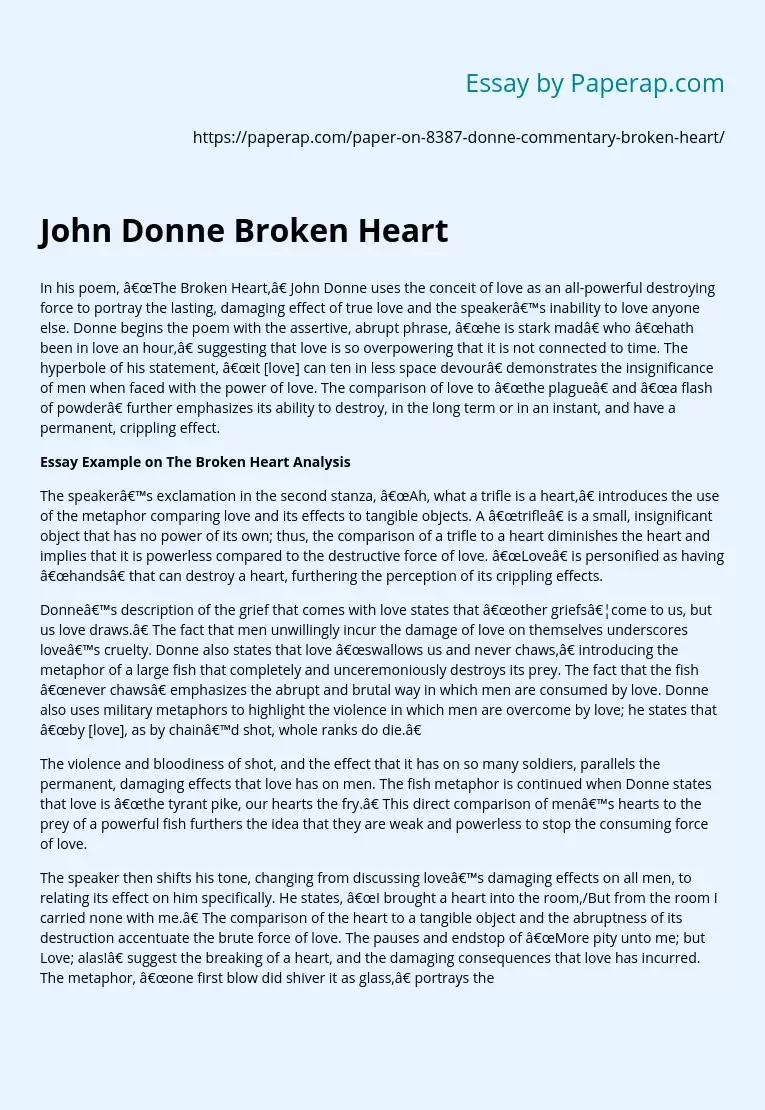John Donne Broken Heart
In his poem, “The Broken Heart,” John Donne uses the conceit of love as an all-powerful destroying force to portray the lasting, damaging effect of true love and the speaker’s inability to love anyone else. Donne begins the poem with the assertive, abrupt phrase, “he is stark mad” who “hath been in love an hour,” suggesting that love is so overpowering that it is not connected to time. The hyperbole of his statement, “it [love] can ten in less space devour” demonstrates the insignificance of men when faced with the power of love.
The comparison of love to “the plague” and “a flash of powder” further emphasizes its ability to destroy, in the long term or in an instant, and have a permanent, crippling effect.
Essay Example on The Broken Heart Analysis
The speaker’s exclamation in the second stanza, “Ah, what a trifle is a heart,” introduces the use of the metaphor comparing love and its effects to tangible objects.
A “trifle” is a small, insignificant object that has no power of its own; thus, the comparison of a trifle to a heart diminishes the heart and implies that it is powerless compared to the destructive force of love. “Love” is personified as having “hands” that can destroy a heart, furthering the perception of its crippling effects.
Donne’s description of the grief that comes with love states that “other griefs…come to us, but us love draws.” The fact that men unwillingly incur the damage of love on themselves underscores love’s cruelty.
Donne also states that love “swallows us and never chaws,” introducing the metaphor of a large fish that completely and unceremoniously destroys its prey. The fact that the fish “never chaws” emphasizes the abrupt and brutal way in which men are consumed by love. Donne also uses military metaphors to highlight the violence in which men are overcome by love; he states that “by [love], as by chain’d shot, whole ranks do die.”
The violence and bloodiness of shot, and the effect that it has on so many soldiers, parallels the permanent, damaging effects that love has on men. The fish metaphor is continued when Donne states that love is “the tyrant pike, our hearts the fry.” This direct comparison of men’s hearts to the prey of a powerful fish furthers the idea that they are weak and powerless to stop the consuming force of love.
The speaker then shifts his tone, changing from discussing love’s damaging effects on all men, to relating its effect on him specifically. He states, “I brought a heart into the room,/But from the room I carried none with me.” The comparison of the heart to a tangible object and the abruptness of its destruction accentuate the brute force of love. The pauses and endstop of “More pity unto me; but Love; alas!” suggest the breaking of a heart, and the damaging consequences that love has incurred. The metaphor, “one first blow did shiver it as glass,” portrays the violence of love’s destructive force and the weakness and powerlessness of the speaker’s heart to resist destruction.
The speaker’s lament, “my breast hath all/those pieces still, though they be not unite” underscores the complete damage that love has inflicted on his heart; not only is his heart not intact, but he must suffer the many small pieces that remain. Finally, the speaker says, “broken glasses show/a hundred lesser faces,” implying that although he may have many more loves, none will come close to the first love that shattered his heart. He conveys the vivid image of his “rags of heart,” compounding the sense that his heart is completely destroyed and useless. The comparison of his ability to “like, wish, and adore” other women to his first love demonstrates their complete inferiority compared to the destructive power of true love.
John Donne Broken Heart. (2019, Nov 27). Retrieved from https://paperap.com/paper-on-8387-donne-commentary-broken-heart/

